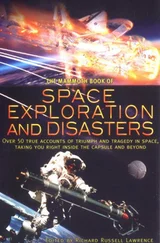Bit by bit, day by day, he came out of it. He started a new routine that conserved his energy and improved his spirits. Every morning after breakfast he began talking on the ham radio in base block, chatting with American amateurs in snippets of a few minutes apiece; Mir moved so quickly across the surface of the Earth it was difficult to maintain a longer signal. At night he tried to finish work at eight and watch a movie. His favorite tapes were old Super Bowls and Dallas Cowboy football games, all of which Al Holland and the NASA psychological support team had sent to the station for him.
Kaleri and Korzun realized the worst had passed one evening when Blaha lingered at the dinner table while the Russians took turns exercising on the treadmill. Up till that point Blaha had never bothered to eat meals with the two Russians, sticking instead to his shuttle-like regimen of eating when he could. “He didn’t talk to us, he just worked,” remembers Kaleri. “For me the first sign he was changing to our lifestyle was on this evening. He didn’t have dinner without us. At first we kept on exercising. We said, ‘John, go ahead, eat.’ He said, ‘No, I’ll wait.’ And he ate with us! From that moment on, it was a totally different life for John. We discovered John was an entirely different person. He liked to talk! We started communicating with him. It was wonderful.”
Blaha’s astronaut replacement was Jerry Linenger, a US Navy doctor. By the time Linenger arrived Blaha was exhausted and on 22 January he left vowing never to do it again.
Linenger spent his days running NASA experiments, for example, Liquid Metal Diffusion, an experiment he ran from a laptop. “Space is a frontier and I’m out here exploring,” he wrote to his son. He exercised regularly on the treadmill, his running making the whole station resonate.
On 12 February 1997 Soyuz-TM25 stopped 150m from Mir. Soyuz-TM25 contained Vasily Tsibliyev, Aleksandr “Sasha” Lazutkin and the German “guest” cosmonaut Reinhard Ewald, who would return to earth with Korzun and Kaleri on 2 March. The changeover period with six people aboard was a crowded time.
As the Kurs system guided them in automatically, 250 miles above the earth, and the distance closed to less than eight feet, a warning came on which said “Approach failure 05”. The braking thrusters fired automatically – the Kurs system had failed 5m out.
The Kurs system was originally made in the Ukraine. After the Ukrainians had put up the price of the equipment by 400 per cent, there were problems getting them to deliver a radar antenna for the Soyuz so the Russians had built their own which repeatedly failed to work in tests because its signal overlapped with that of another antenna in one of the station’s systems. The Soyuz drifted away from the station until it was 12m off. TsUP ordered a manual docking. Tsibliyev brought the Soyuz in inch by inch and made a successful dock, which entitled him to a $1,000 bonus.
The fire occurred during the changeover period between Mir 22 and Mir 23. After dinner on 23 February, at 10 pm, Linenger went to Spektr to set up a study experiment, while Lazutkin went to Kvant to put a fresh Lithium perchlorate cylinder in the solid-fuel oxygen generator (SFOG) as it was necessary to generate additional oxygen during “changeover”. Burrough:
He had just inserted the new cylinder when he heard a hissing noise. He turned and saw sparks flying from the top of the cylinder. Before he could react there was a flame which he described as “a baby volcano”. He remembered thinking: This is unusual. It shouldn’t be doing this. Why is it doing this? My first idea was I had done something wrong.
He shouted, “Guys we have a fire!” but no one heard him.
Hovering at the base-block table about ten feet from where Lazutkin was marveling at the “baby volcano” he had somehow created, Reinhold Ewald was the first to react. “I saw flame spitting out of the device, literally into Sasha’s hand,” he remembered.
“Pozhar,” Ewald said, mouthing the Russian word for fire.
At first Tsibliyev, who was in the air just across the table from Ewald, his back to Kvant, didn’t think anyone had heard the German’s words. Tsibliyev remembered: I see Ewald’s face, I read his lips, he says the word so softly, I didn’t think anyone hears him.
Turning, Tsibliyev saw the fire erupting in front of Lazutkin and repeated the word, this time loudly: “Pozhar!”
Tsibliyev recalled: “I said, ‘Pozhar,’ but I didn’t think anyone believed me.”
Valery Korzum did. Korzum, hovering above and to Ewald’s right, could not at first see into Kvant. Lowering his head to peer inside, he instantly saw flashes of bright orange and white flame erupting all around Lazutkin. In a split second, he pushed off from a side wall and flew across the table, cutting through a gap between Tsibliyev and Kaleri. In moments he was past the toilet entrance and into Kvant.
“Pozhar! Pozhar!” Korzun hollered as he passed. Smoke, grayish and white, was already enveloping Lazutkin.
“Korzun flew in like this giant hawk,” Lazutkin remembered with a smile. It was so like the commander, the strapping, macho Cossack coming to his smaller friend’s rescue. As Korzun settled at his side, Lazutkin reached out and switched off the red-hot canister, but it had no effect. The oxygen from the canister was obviously fueling the fire, creating the blowtorch effect. The flame was shooting up into the open air in the center of the module, flashes of sharp red and pink, at a 45 degree angle in front of him. It seemed to be nearly two feet long and growing.
Lazutkin jerked a wet towel from a holder on the wall and threw it onto the flame, which instantly engulfed it. Flaming bits of towel swirled up and around the module. Lazutkin ducked back, fearing his hair would catch on fire. Korzun, hovering at his side, immediately realized the flame was too big to be smothered.
“Get the fire extinguishers!” he said.
Fire in a zero-gravity environment is not something human beings know much about. Both Linenger and Shannon Lucid, in fact, ran experiments in which they observed an open flame in a self-contained glovebox. It is gravity that causes a flame on Earth to flicker upward; in zero gravity, fire expands in all directions at the same speed, creating a flame that looks like a burning ball. The fire that erupted in front of Sasha Lazutkin looked nothing like a ball, however. Oxygen roaring out of the SFOG sent it shooting outward much as it would on Earth.
Everyone in base block was startled by Korzun’s sudden call for fire extinguishers. Hovering at the dinner table, his back to the fire, Sasha Kaleri turned to see it and immediately realized what was happening. To him the fire appeared a reddish shining in the air; he saw sparks cascading through the module around Lazutkin. Much like Lazutkin, he resisted a powerful impulse to leap into the module and attempt to smother the fire. Two people are already a crowd, he remembered thinking. When Korzun called out for a fire extinguisher, Kaleri had a small problem: the postcards and envelopes in his hands. As fast as he could, he jammed several into niches beneath the table and others into a nearby sack.
Sitting beside Kaleri, Tsibliyev, who served on the fire brigade at his Crimean grade school, didn’t need to be told to grab fire extinguishers. There were two attached to the walls in base block, and the moment Korzun soared into Kvant, Tsibliyev flew over and grabbed one. The other he reached just as Kaleri tore it from its holder. Kaleri took one of the fire extinguishers and passed it through the hatch to Lazutkin, who quickly passed it to Korzun.
Читать дальше












